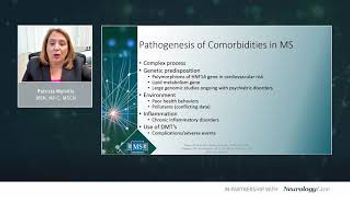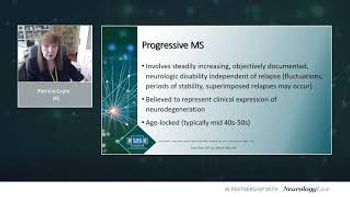
News








Patricia Melville, NP-C, MSCN, and Marijean Buhse, PhD, NP-C, MSCN, present their lecture titled, "Comorbidities and MS: Critical Thinking About DMTs and Vaccines" as part of the 2020 CMSC Virtual Annual Meeting.

Peter Calabresi, MD, delivers the Whitaker Lecture as part of the 2020 CMSC Virtual Annual Meeting.

Amy Sullivan, PsyD, ABPP, presents her lecture titled, "Science, Art, and Practice of Behavioral Medicine" as part of the 2020 CMSC Virtual Annual Meeting.

Brian Weinshenker, MD presents his lecture titled, "Neuromyelitis Optica Spectrum Disorders: Emerging Treatment Options" as part of the 2020 CMSC Virtual Annual Meeting.

Patricia Coyle, MD, delivers her lecture titled, "Progressive MS: Diagnosis, Clinical Course and Long-Term Management" as part of the 2020 CMSC Virtual Annual Meeting.

Evobrutinib, a highly selective BTK inhibitor for the treatment of relapsing multiple sclerosis, showed long-term safety and success in reducing annualized relapse rates.












The Genentech agent, which is approved for patients with relapsing-remitting multiple sclerosis, showed no new safety signals in a comparison between conventional and shorter infusion times.

Novartis’s anti-CD20 monoclonal antibody has been shown to increase the odds of patients with multiple sclerosis achieving no evidence of disease activity status by more than 3-fold in the first year and more than 8-fold in the second year.

This AUPN Leading Edge Special Episode features Clifton L. Gooch, MD, and Justin C. McArthur, MBBS, MPH, who discuss how their institutions and departments are approaching operations amid COVID-19. [LISTEN TIME: 21 minutes]

Plasma neurofilament light chain (pNfL) may serve as a prognostic tool to assess the risk of developing permanent disability in multiple sclerosis.

The staff neurologist, Vice-Chair of Operations, and Quality Improvement Officer at Cleveland Clinic Neurological Institute detailed his experience managing patients with various conditions through a telemedicine platform.

The professor of neurology at NYU Langone shares her thoughts on the clinical data that has been released so far on patients with COVID-19.
